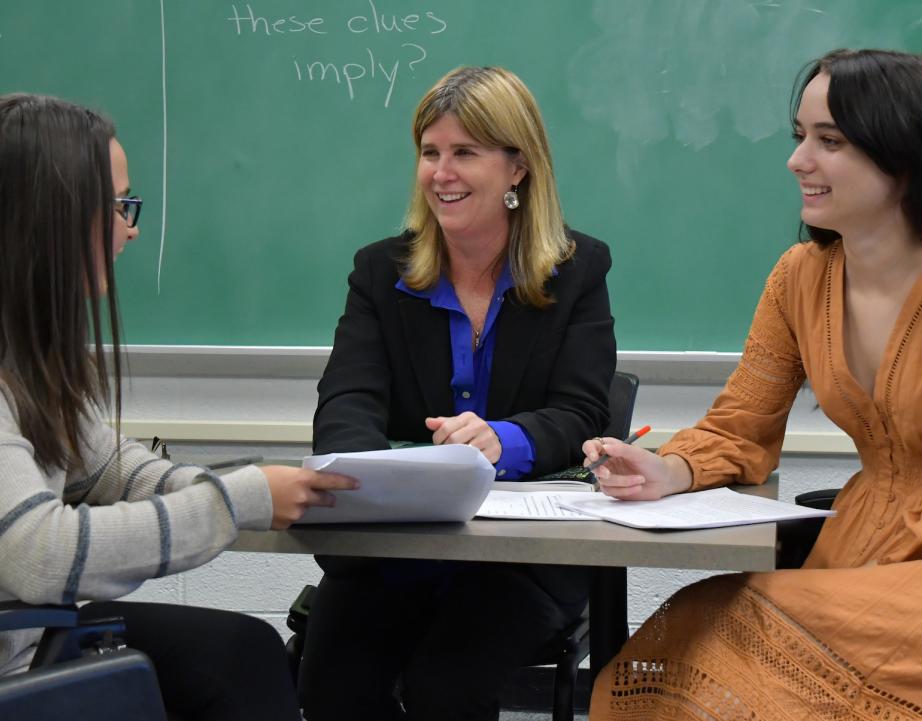Wednesday, Jun 12, 2019
Content not typically covered in curriculum
by Keith Fernbach
Starting in the fall of 2019, Rider University will begin offering a new course for graduate students in the school counseling program focused on how to more effectively provide career counseling to children in grades K-12.
The course, "Vocational/Career Development in Educational Settings," is being developed by Dr. Christina Peterson, professor and chair of the Department of Graduate Education, Leadership, and Counseling. She says she is aware of only one other university offering a course fully dedicated to this topic, and none in this region of the country.
According to Dr. Peterson, the course was created in response to feedback the school counseling program received from both students and supervisors in the field.
“They indicated that a key deficit area in school counselor preparation in New Jersey is career development,” she says. “School districts wanted a greater focus on how counselors can work with students to think about their next steps and how their plans relate to their sense of identity and self.”
In 2016, Rider offered a five-day workshop on this topic that exceeded capacity, further solidifying the fact that there was more than sufficient demand for the course. Students who attended the workshop indicated that the content was essential and is not content typically covered in a counseling curriculum.
Dr. Peterson agrees, explaining that until now, the topic of career development for K-12 was covered in only a few class sessions as part of a broader career-counseling course that primarily focused on adults.
“With this new course, we’re just looking at childhood and adolescence,” she says. “We want to help counselors move beyond thinking about career from a trait and factor perspective, in which a student’s interests are matched to a job or college major. Instead, we will conceptualize work as an extension of the self. Career decision-making comes from the development of a strong self-concept…awareness of interests, skills, values, personality, and context. The task of the counselor is to help students build that self-concept.”
She adds that within the K-12 age group, there are vastly different approaches taken with younger students versus those who are in high school.
“In the early years, children are in the stages of exploration and growth. They are playing with identity, and are asking, ‘Who am I? What is important to me? What do I enjoy? What do I think is silly or wonderful?’” she says. “Our task is to open up possibilities to them beyond their immediate world, which is typically comprised of their parents, their broader family, and the immediate community. Our job is to expand beyond that, to feed their curiosity and fantasy, and help them to envision the myriad of possibilities.”
A key driver in broadening horizons, Dr. Peterson says, is also advocacy, as counselors work to make sure they don’t replicate some of the social inequities that exist within the adult system.
As children get older, the “narrowing down” begins and more focus is given to identifying specific student strengths and helping to guide them toward potential majors or careers.
“Around middle school, they start to get rewarded for successes and to develop a self-concept that connects to those successes. They start to figure out this sense of who they are, what they have to offer, the unique attributes of themselves, and how that connects to specific coursework within the school.”
The course will also delve into topics including how to assist students who are inadequately resourced and need to do things like visit colleges and apply for scholarships; helping students who are not planning to go to college consider other options; and how to approach situations such as when the desires of parents do not align with their children’s career goals, or there’s a disconnect between students’ aspirations and their clearly exhibited strengths.
Kaitlin Sleight '18, a graduate of Rider’s school counseling program who is currently a college and career counselor at Chatham High School in New Jersey, is assisting Dr. Peterson in developing the course.
“When Kaitlin was a student at Rider, it was clear to me that she had a great passion for career counseling, and we did some work together that went above and beyond what was covered in class,” says Dr. Peterson. “As we collaborate on this course, I’ll be providing the theoretical approach and she is going to offer the practical perspective. In this way, we can connect what the literature says we should be doing with the realities of working in a school setting.”
In addition to being a required course for students in the school counseling program, it will also be one of the three courses needed in order to earn a life and career coaching certification from Rider, a pre-counseling credential that teaches students basic techniques for listening to and helping individuals come to a solution-focused plan of action. Life coaches assist clients in achieving goals in areas such as life transitions, significant relationships, physical health, emotional well-being, career choices, and spirituality, but do not work with clients with mental disorders.
Those interested in learning more about the "Vocational/Career Development in Educational Settings" course can contact Dr. Peterson at cpeterson@rider.edu.

